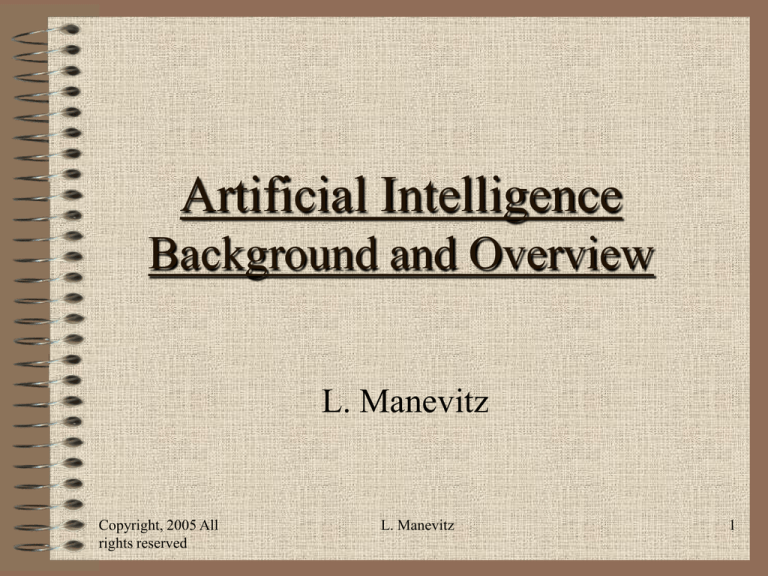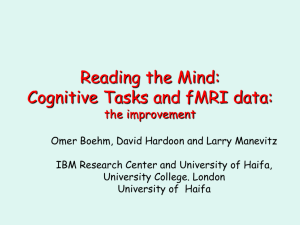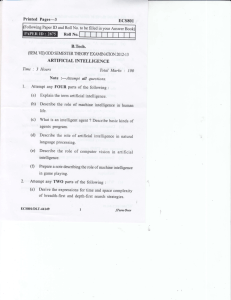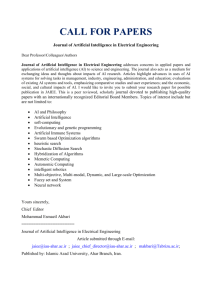
Artificial Intelligence
Background and Overview
L. Manevitz
Copyright, 2005 All
rights reserved
L. Manevitz
1
Artificial Intelligence-What is it?
Je pense
dont
je suis !
HAL -2001
Copyright 2006
All rights reserved
L. Manevitz
2
Requirements
• Two – three projects (obligatory)
• Final
• Final Grade – between 33% - 67% projects
(probably 40 - 50%)
• Late projects will be penalized
• Attendance in Lectures is strongly recommended
Copyright 2006
All rights reserved
L. Manevitz
3
Text and References
• Texts: (on reserve)
– Elaine Rich Artificial Intelligence
– Nils Nilsson Artificial Intelligence
– Patrick Winston Artificial Intelligence
– Newer Books:
– Russell & Norvig Artificial Intelligence: A Modern
Approach
– Nils Nilsson Artificial Intelligence:A New Synthesis
- Webber & Nilsson Readings in Artificial Intelligence
Copyright 2006
L. Manevitz
.
All rights reserved
4
What is Artificial Intelligence?
•
•
•
•
•
How do we define it?
What is it good for?
History ?
Successes/ Failures?
Future Outlook?
http://www-formal.stanford.edu/jmc/whatisai/whatisai.html
Copyright 2006
All rights reserved
L. Manevitz
5
Possible Examples?
•
•
•
•
•
•
•
•
•
•
•
•
Chess?
Recognizing Credit Card Fraud?
Automatic Train Driver?
Automatic Car Driver?
Recommender System?
Agents in a Computer Game?
Boy Robot in movie “AI”?
Emotions?
Solving Geometry Problems?
Proving Theorems?
Giving Directions?
Answering Questions for Registering Students?
Copyright 2006
All rights reserved
L. Manevitz
6
What is intelligence ?
Eureka
!
Copyright 2006
All rights reserved
L. Manevitz
7
How do we define it?
• What is artificial intelligence?
• What is natural intelligence?
• How do we know if we achieve it?
Copyright 2006
All rights reserved
L. Manevitz
8
Psychology
• How do humans and animals think and
act?
• Cognitive Psychology and Cognitive
Science
• Behaviorism
Copyright 2006
All rights reserved
L. Manevitz
9
Neuroscience
• How does the Brain Work?
• Compare with Computer?
–
–
–
–
10**11 neurons vs 1 CPU (10**8 gates)
10 **-3 sec vs 10 **-10 sec
10**14 bits/sec vs 10**10 bits/sec
Moore’s Law (doubles every 1.5 years) CPU
gate count will equal neurons in 2020.
– Does this mean anything?
Copyright 2006
All rights reserved
L. Manevitz
10
Mathematics
• Formal Rules to Draw Conclusions
• What can be Computed?
– Godel’s Theorem
– NP completeness
• How to Reason with Uncertain
Information?
• Probability
• Game Theory
Copyright 2006
All rights reserved
L. Manevitz
11
Are the Means Important?
• Black Box – raw power versus
“cleverness”
• Or White Box - somehow models how
people work
• Or White Box – somehow cleverness
sneaks in by some over-riding idea?
Copyright 2006
All rights reserved
L. Manevitz
12
Is Adaptivity (learning) Crucial?
Copyright 2006
All rights reserved
L. Manevitz
13
Artificial Intelligence
• Goals.
• Methods.
• Examples.
Copyright 2006
All rights reserved
L. Manevitz
14
Goals in A.I.
• Understand thinking.
• Make computers perform tasks that require
intelligence if performed by people.
“Asking if a computer can
think is like asking if a
submarine can swim.”
Dijkstra
Copyright 2006
All rights reserved
L. Manevitz
15
Goals in A.I.
Main Goal :
Artificial intelligence.
Sub Goal :
Understanding human intelligence and
how it is possible.
Related subjects :
Neurophysiology
Cognitive Psychology
(Artificial Neural Networks)
Copyright 2006
All rights reserved
L. Manevitz
16
What sort of Functionality Is
Needed?
• To act humanly? (See Turing Test)
–
–
–
–
–
–
–
–
Natural language processing
Knowledge Representation
Automated Reasoning
Machine Learning
Decisions under uncertainty
Computer Vision
Robotics
Speech Recognition
Copyright 2006
All rights reserved
L. Manevitz
17
What sort of Functionality Is
Needed?
• To act humanly? (See Turing Test)
• To think humanly? (See Cognitive Science)
Needs Human tests
• To think rationally?
– Logic and logicist tradition
– Game Theory and Rationality
• Act Rationally?
– (Back to Turing Test); limited rationality?
– Environment Important
Copyright 2006
All rights reserved
L. Manevitz
18
Copyright 2006
All rights reserved
L. Manevitz
19
AI Supplements Philosophy,
Psychology, Linquistics, etc.
1) Use of computer metaphors has led to
rich language for talking and thinking
about thinking.
2) Computer models force precision.
3) Computer implementations quantify task
requirements.
4) Computer programs can be experimented
on in ways that animal brains can not.
Copyright 2006
All rights reserved
L. Manevitz
20
Aspects
• Engineering :
Solve “real world” problems using ideas
about knowledge representation and
handling.
• Scientific :
Discover ideas about knowledge that helps
explain various orts of intelligence.
Copyright 2006
All rights reserved
L. Manevitz
21
State of the Art
• NASA Mars Robots (planning program)
• Game Playing: Deep Blue & Junior, etc
• Autonomous Control and Learning
– Alvinn (CMU) drove across the USA (98% of the
time)
Medical Diagnosis Programs –state of art
AI Planning handles US logistics (“repaid all DARPA
expenditures ever” from ’91 Gulf War”)
Robotics Assistant Surgery
Language Understanding and Problem Solvers
Recognizing Cognitive Actions by Looking at Brain
Copyright 2006
L. Manevitz
Scans!
All rights reserved
22
Applications
•
Farming robots, Manufacturing,
Medical, Household.
•
Data mining, Scheduling,
Risk Management Control, Agents.
• Internet + AI : natural laboratory
Copyright 2006
All rights reserved
L. Manevitz
23
Underlying Hypothesis
• Physical Symbol Hypothesis (Newell) :
A physical symbol system has the necessary and
sufficient means for intelligent action.
This hypothesis means that we can hope to
implement this in the computer.
• Note : Use of term “intelligent action” not
“intelligence”. Compare with Searle “Chinese
Room”.
Copyright 2006
All rights reserved
L. Manevitz
24
Definitions of AI
• “Science of making machines do things
that would require intelligence if done by
man.”
M. Minsky
• “… make computers more useful and to
understand principles that make
intelligence possible”
P. Winston
Copyright 2006
All rights reserved
L. Manevitz
25
Definitions of AI cont.
• “… main tenet that there are common
processes underlie thinking … these can be
understood and studied scientifically …
unimportant who is doing thinking – man
or computer. This is an implementation
detail.”
N. Nilsson
Copyright 2006
All rights reserved
L. Manevitz
26
Some History
• Literature: Golem, Frankenstein, Odysseus,
Asimov, …
• Rules of Thought: Greeks (Aristotle, correctness
of proofs), Formal Systems (Aristotle, Saadia
Gaon), Leibniz, Boole, Godel, Turing.
Note two aspects: Physical and Mental
(corresponds to Robotics and AI today)
Copyright 2006
All rights reserved
L. Manevitz
27
Some History
•
•
•
•
•
•
Babylonians
Greeks – Plato, Aristotle, Greek Mythology
Arabic Culture – Saadia Gaon, AlKhwarzi
Frankenstein, Golem
Analytical Engine, Babbage, Lovelace
Mechanical Calculation and Mechanical Proof - Pascal,
Leibniz, Hilbert
• WWII : Turing, von Neumann, Godel, ACE , Einiac
• Artificial Neuron
• Dartmouth (Modern AI)
• Distributed Agents, Internet
Copyright
2006
L. Manevitz
•
Machine
Learning
All rights reserved
28
What sort of Functionality Is
Needed?
• To act humanly? (See Turing Test)
• To think humanly? (See Cognitive Science)
Needs Human tests
• To think rationally?
– Logic and logicist tradition
– Game Theory and Rationality
• Act Rationally?
– (Back to Turing Test); limited rationality?
– Environment Important
Copyright 2006
All rights reserved
L. Manevitz
29
What sort of Functionality Is
Needed?
• To act humanly? (See Turing Test)
–
–
–
–
–
–
–
–
Natural language processing
Knowledge Representation
Automated Reasoning
Machine Learning
Decisions under uncertainty
Computer Vision
Robotics
Speech Recognition
Copyright 2006
All rights reserved
L. Manevitz
30
• 1940s Turing, Shannon, Von Neumann.
• 1950s –1960s Learning Machines; Naïve
Translators,Naïve Chess Programs, (Simon’s 10 year
prediction) Perceptrons.
• 1960s – 1970s MIT, Stanford,Carnegie-Mellon,(Minsky,
McCarthy, Simon) General Purpose Algorithms.
• 1980s Multi-level Perceptrons,Expert Systems,
Knowledge Based Systems, Logical AI, Uncertainty
Reasoning.
• 1990s NN applications, Theory of Learning, Agent
Paradigm,Internet Applications,Space Robots,Computer
Chess Champion.
• 2000s SVM and Kernel Learning, Mixed applications,
multiple agent interactions and game theory
Copyright 2006
All rights reserved
L. Manevitz
31
Overall Approaches to AI
• Solve Global Problem – Try to pass Turing Test –
philosophical
• Solve Specific Problems in Areas – also make
things useful; engineering, experimental; find
anything that works
• Solve things by mimicing human cognition;
experiments with humans
• Solve things by mimicing physical processes;
neuroscience, evolution, understanding
randomness
Copyright 2006
All rights reserved
L. Manevitz
32
Spin-offs of A.I.
• The Computer.
• Formal Mathematical
Logic.
• Much of Mathematics.
• Time Sharing.
• Computer Languages.
• Computer Vision.
• Expert Systems
• Theory of Learning
Copyright 2006
All rights reserved
•
•
•
•
•
•
•
•
L. Manevitz
Data Mining.
Soft bots.
Expert Systems
Robotics.
Video Display.
Information retrieval.
Machine Learning
Computer Games
33
Problems addressed by A.I.
•
•
•
•
Game playing.
Theorem proving.
Perception (Vision, Speech).
Natural Language Understanding.
Copyright 2006
All rights reserved
L. Manevitz
35
Problems addressed by A.I. cont.
• Expert Problem Solving :
–
–
–
–
•
•
•
•
Symbolic Mathematics.
Medical Diagnosis.
Chemical Analysis.
Engineering Design.
Intelligent Agents.
Automated Negotiation.
Data Mining.
Web Search.
Copyright 2006
All rights reserved
L. Manevitz
36
Artificial Intelligence
•
•
•
•
•
•
•
•
Expert Systems.
Vision.
Speech.
Language.
Games.
Planning and Action.
Theories of Knowledge.
Neural Networks.
Copyright 2006
All rights reserved
L. Manevitz
37
Fields of Application
•
•
•
•
•
•
•
Expert Systems.
Language Understanding.
Robotics.
Automated Negotiation.
Internet Retrieval.
Educational Tools.
Software Assistants.
Copyright 2006
All rights reserved
L. Manevitz
38
Give examples of Expert
Systems
•
•
•
•
Xcon
System Pressure
Air Pressure
Differential Equations
Copyright 2006
All rights reserved
L. Manevitz
39
Methodologies
• Algorithmic (e.g. vision …).
• Heuristic (games, expert systems).
• Linguistic, Semantics (speech, language
understanding).
• Symbolic Manipulation (most subjects).
• Logical Systems (formal)
• Game Theoretic.
Copyright 2006
All rights reserved
L. Manevitz
40
Methodologies cont.
• Truth Maintenance Systems.
• Fuzzy Logic (knowledge representation,
expert systems).
• “Knowledge Engineering” (expert
systems).
• Neural Networks (learning-non-symbolic
representations).
• Baysean Analysis + related (uncertainty
processing)
• Learning Systems and learning theory.
Copyright 2006
All rights reserved
L. Manevitz
41
Types of programs in A.I.
• Theoretically all programming languages and
computers are equivalent.
• Practically there are huge differences in
efficiency, even possibility NP-complete
problems.
• Languages:
– LISP – very flexible.
– PROLOG – designed to fit “back tacking”,
“resolution”, expert systems.
• Methodology :
– Heuristic vs. Algorithmic.
Copyright 2006
All rights reserved
L. Manevitz
42
• Algorithm :
A recipe (set of instructions) which when
followed always gives the correct solution.
• Feasible Algorithm :
An algorithm which can in fact be
implemented in such a way that the
solution can be found in a reasonable time.
Copyright 2006
All rights reserved
L. Manevitz
43
• Heuristic :
a set of instructions which one has reason
to believe will often give reasonably
correct answers.
Copyright 2006
All rights reserved
L. Manevitz
44
Heuristic vs. Algorithmic
Heuristic :
• Rules of the thumb.
• No guarantee.
Algorithmic :
• Guarantee correct results.
Copyright 2006
All rights reserved
L. Manevitz
45
Why use heuristic ?
• Many problems either :
– Can be proven to have no algorithm :
• Theorem proving.
• Halting problem.
– Can be proven to have no feasible algorithm :
•
•
•
•
NP-complete.
Traveling salesman.
Scheduler.
Packing.
– No algorithm is known although one exists :
• Chess.
Copyright 2006
All rights reserved
L. Manevitz
46
Examples of heuristics functions
• Chess :
– No. of my pieces – No. of opponents.
– Weighted values of pieces.
– Positional ideas.
• Traveling Salesman :
– Comparison with neighbors.
Copyright 2006
All rights reserved
L. Manevitz
47
Algorithmic Aspects
• Undecidable Problems.
• Infeasible Problems.
• People versus NP-complete.
Copyright 2006
All rights reserved
L. Manevitz
48
Other Techniques
• General Search and Matching Algorithms
• Representations of Knowledge
–
–
–
–
(See book by E.Davis : Naïve Physics,
Conceptual Dependencies (Schank),
Object Oriented
Models of Memory: Kanerva, Anderson, Grossberg
• Logic (See LICS conferences)
– Automatic Theorem Proving
– Non-Traditional Logics
• Non-monotonic Logics
• Circumscription
Copyright 2006
L. Manevitz
•
Closed
World
Assumption
All rights reserved
• Prolog
49
Other Techniques (cont)
• Dealing with Time
– Logics: Temporal and
Modal
– Noise in Neural Networks
• Uncertainty
– Baysean Networks (Pearl)
(Microsoft assistant)
– Combination Formulas
•
•
•
•
Dempster-Shafer
Fuzzy Logics
Hummel-Landy-Manevitz
Mycin, etc
– Independence Assumptions
and Weakenings
Copyright 2006
All rights reserved
•
• Natural Language
• Speech
• Vision
High Level;
low level
• Learning
Inductive,
Genetic Algorithms,
Learning Theory
• Neural Network
Approach:
Representation, Learning
• Other Machine Learning
Approaches
L. Manevitz
50
Philosophy
• Is there any possibility of AI?(Searle,
Dreyfuss, Symbol Manipulation
Assumption, Godel’s Theorem,
Consciousness).
• What would it mean to have AI?
• Turing Test: Makes Sense or Not?
Copyright 2006
All rights reserved
L. Manevitz
51
Turing Test
computer
person
tester
Copyright 2006
All rights reserved
L. Manevitz
52
Searle’s Chinese Box
•Chinese
•English workers
•ChineseReferences
Copyright 2006
All rights reserved
L. Manevitz
•Chinese
53







